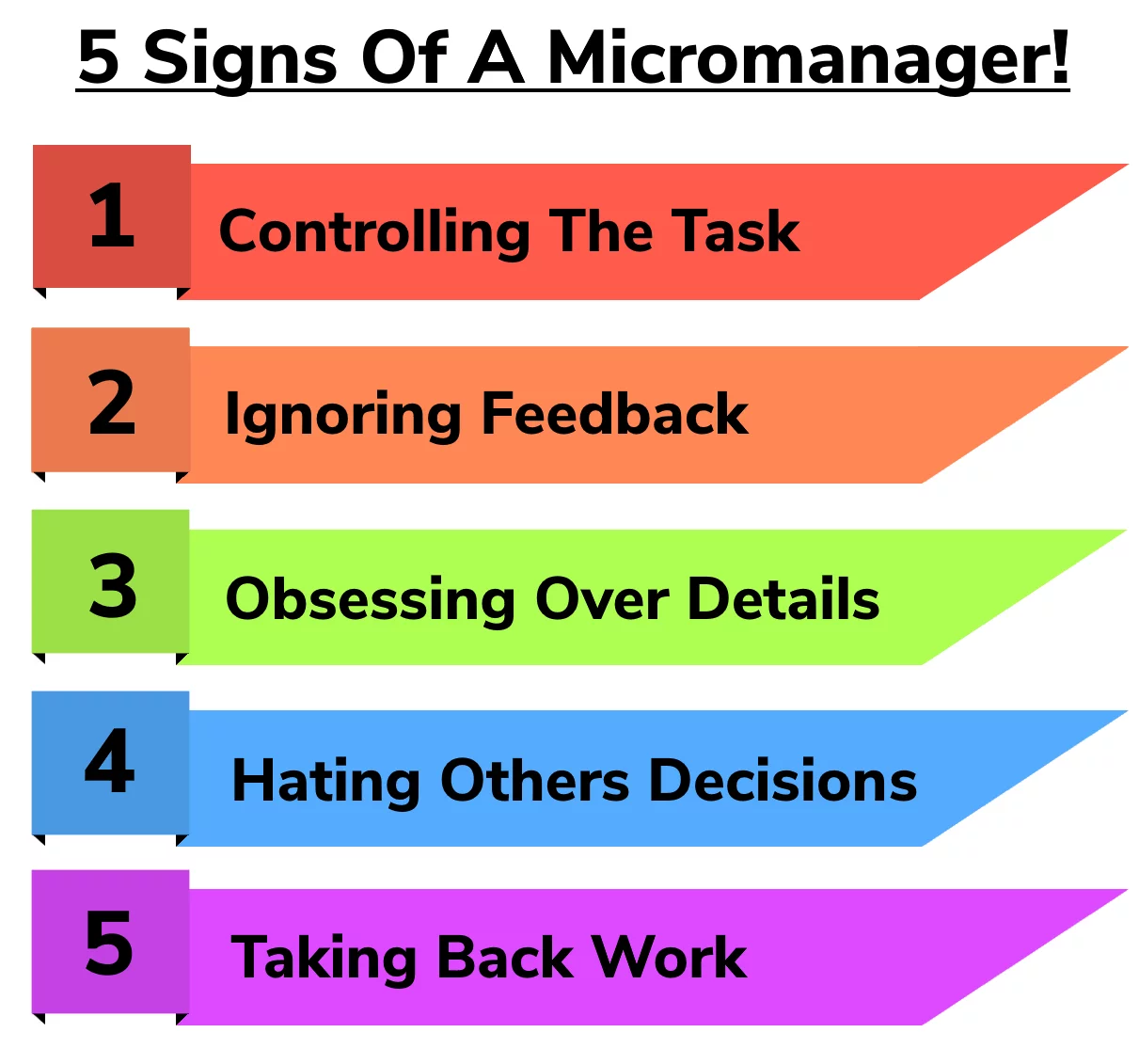
Learn To Spot Micromanagement In Just 2 Minutes!
Contents
Have you ever been micromanaged?
If so, you know how demotivating it is.
Lets take an in-depth look at micromanagement.
What Is Micromanagement?
Micromanagement describes a management style that involves:
Excessive supervision and over-attentiveness to minor details.
They heavily scrutinize a team member’s work and methods.
Micromanagers try to control all aspects of an assigned task, rather than delegating tasks properly.
Usually, micromanagement is a way for the team leader to manage their feelings of lack of control.
Micromanagers require excessive reporting on a task to maintain a sense of control.
They will go to extreme lengths to involve themselves in all aspects of a job assigned to a subordinate.
Even when it is one the subordinate has completed successfully before.
How To Spot A Micromanager
Signs that your manager is a micromanager include:
1. Controlling The Task
If your manager is concerned about the processes you carry out to complete a task or project and not the outcome.
They are probably a micromanager.
Micromanagers focus less on results and more on making sure you are doing things their way.
2. Ignoring Feedback:
Micromanagers tend not to be good at acting on feedback.
If your manager is constantly ignoring your feedback, then they may be a micromanager.
Micromanagers miss out on the experience that team members could offer by listening to them carefully.
3. Obsessing Over Details:
Being detail-oriented is a desirable trait, but in a manager, this can become suffocating.
Managers and leaders should focus on the big picture and leave their team members to deal with the details.
4. Hating Decisions Made Without Them:
Micromanagers hate decisions being made without them.
Their need for control makes delegated decision-making very difficult for them.
So someone who struggles a lot with delegated decision making is likely to be a micromanager.
5. Taking Back Work When There’s A Problem:
At heart, micromanagers don’t like delegating work.
Mistakes and problems give them the excuse that they’re looking for to take back work.
After all, this is what they were worried about in the first place.
Micromanagement isn’t a black and white thing.
We all sit on a spectrum, and it only becomes an issue when this trait is excessive and out of control.
You acn learn more about it on our line manager courses!
Why Do People Become Micromanagers?
Micromanagers seldom see themselves that way. They believe that they are good, detail-oriented managers.
Micromanagement is a combination of nature and part nurture.
1. Character Traits
People most inclined to be micromanagers show the following fear-based characteristics.
- Fear of losing control
- Need to be seen as an authority
- Fear of turning in subpar work
These character traits can be exacerbated when someone feels insecure, for example:
When they are new to a supervisory position or if they have been told that their team’s performance is poor.
2. Organisational Culture.
Different organisations have different cultures and business hierarchies.
Businesses whose leadership emphasises control and detail-orientation or that are highly pressured will encourage micromanagement.
Some people will always micromanage no matter where they work.
Others who may tend towards it less strongly will be more heavily influenced by their employer’s culture.
Someone who might not ordinarily micromanage can be turned into a micromanager by their organisation’s culture.
Why Is Micromanagement So Harmful?
Studies show that autonomy is one of the biggest drivers of employee engagement.
Working for a micromanager is the opposite of having autonomy.
Micromanagers bring a rapid drop in employee engagement and an increase in the problems that that brings.
Micromanagement can get good results in the short term, but it is very damaging in the longer term.
7 Ways It Impacts Employees
Micromanagement impacts teams across the board. Let’s look at some of the specific ways that it can impact people.
1. Reduced Productivity:
The time a manager spends nitpicking is time that they and their team member aren’t spending on productive work.
2. Reduced Teamwork:
Micromanagement forces employees to work with their manager individually instead of working together as a team.
3. Poor Morale:
Micromanaged teams are not happy or motivated teams.
A boss that is never satisfied and tends to focus on the negative is not a receipe for a happy team.
4. Loss Of Ownership:
Being told exactly how to do something and kept rigidly to that plan inevitably leads people to lose a feeling of ownership of their work.
After all, if you’re told exactly how to do something, and it goes wrong, it’s not your fault.
Equally, if it goes well, you can’t really celebrate in the same way, as what you did wasn’t your idea.
5. Employee Absence:
The irritations and frustrations of working for a micromanager tend to mount up over time.
They lead to reduced employee engagement and increased employee absences, as people feel less enthusiastic about going to work.
In extreme cases, the mental health of team members can be impacted.
6. Limiting Employee Growth:
One of the principal ways that growth occurs, personally and professionally, is by making mistakes.
A micromanaging boss has no room for errors. Which means the employees can’t grow.
7. High employee turnover rate:
All the above effects eventually lead to employees leaving the company after only a short period due to the hostile work atmosphere.
Is Micromanagement Ever Appropriate?
Micromanagement is only ever appropriate temporarily when a project is going wrong.
At this point, it is appropriate for a manager to involve themselves more deeply in the project.
This will allow them to analyse where it has gone wrong and put the appropriate fixes in place.
However, at this point, they should then step back and leave the team member to get on with it.
Ideally, this analysis will be done collaboratively with the person carrying out the work so that they still feel a sense of ownership and agency.
Some people believe that it is appropriate to micromanage when a very particular outcome is required.
If this is the case, then the manager needs to be sure that their team understands this clearly at the outset.
Requiring a very particular outcome isn’t a reason to become a micromanager.
Final Thoughts
We are all on a spectrum with micromanagement.
No one is immune from it.
So keep an eye out for it in yourself as you develop your management skills
Being aware of your strengths and weaknesses is key to becoming an effective Line Manager.
For more tips for supervisors, access our article on the topic.
- Facebook: https://www.facebook.com/profile.php?id=100066814899655
- X (Twitter): https://twitter.com/AcuityTraining
- LinkedIn: https://www.linkedin.com/company/acuity-training/







